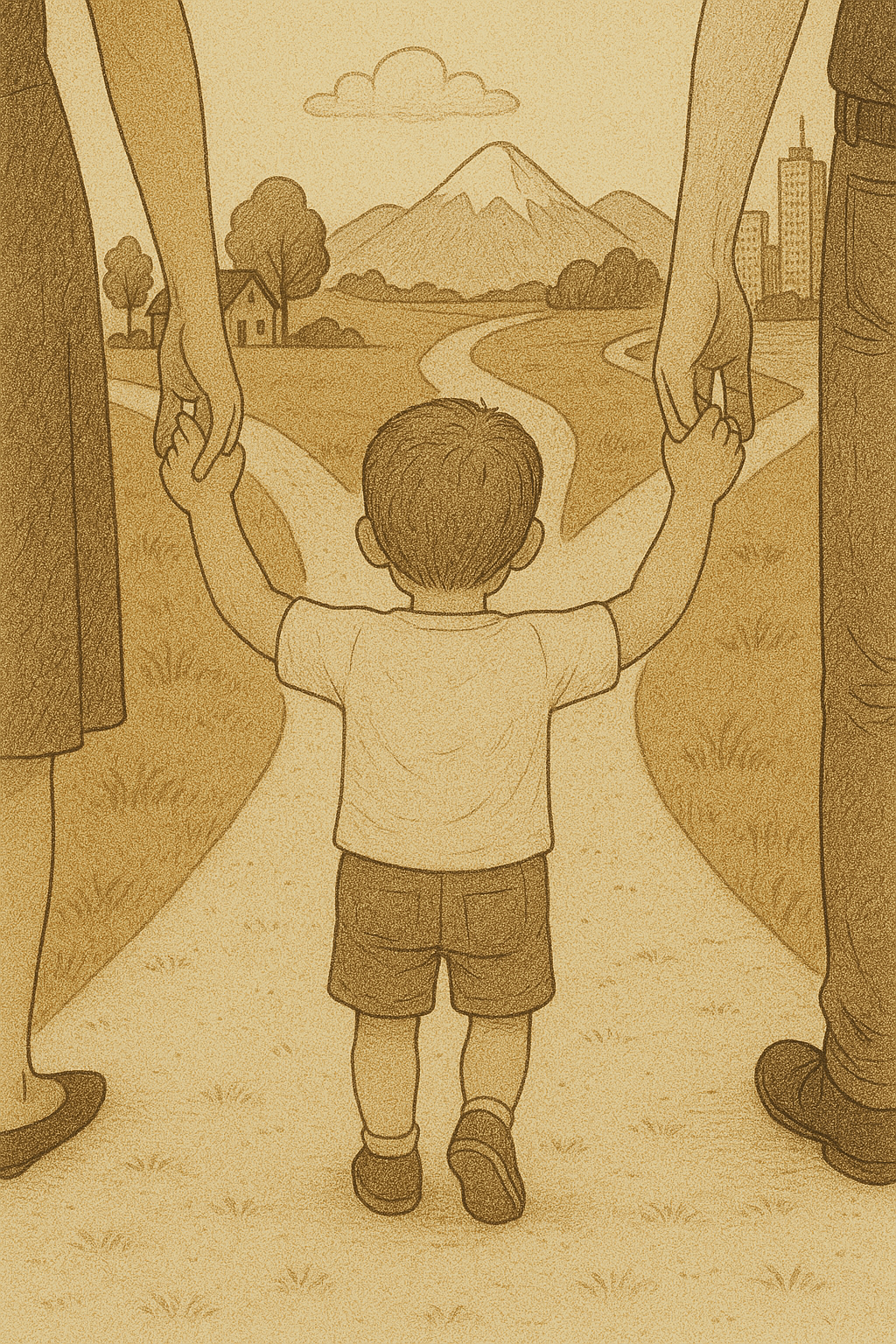02.Quando e come iniziare?
Se siamo fortunati, il primo passo nel viaggio della conoscenza di sé inizia quando siamo piccoli.
È in famiglia che si pongono le prime basi:
"I bambini cominciano a costruire un senso del sé non solo attraverso ciò che dicono di loro, ma soprattutto attraverso ciò che sentono essere permesso o proibito."
— John Bowlby nel libro Attaccamento e perdita ha descritto come le esperienze relazionali precoci con le figure di riferimento influenzino la formazione dell’identità e delle emozioni fondamentali.
Pensiamo ai giochi proposti, nelle attività suggerite, nei libri che ci vengono letti o messi tra le mani. In alcuni contesti culturali, come nei paesi dell’Est esiste un rituale che avviene intorno all’anno di età: si dispongono davanti al bambino oggetti diversi e si osserva quale sceglierà. È un gioco, ma anche un’intuizione profonda. Si dice che l’oggetto scelto rivelerà qualcosa della sua personalità o del suo futuro.
Ma non tutte le famiglie sono così vogliose di esplorare . In molte case si cresce seguendo percorsi già tracciati, dove i genitori, spinti da convinzioni culturali o personali, indirizzano i figli verso strade che forse non sono le loro. È qui che può nascere il primo conflitto interiore. Se non ci si sente liberi di esprimere sé stessi, si comincia a indossare maschere. Non lo si fa per inganno, ma per sopravvivenza. Per essere amati, accolti, accettati.
Lo psicologo Carl Rogers, nel suo libro Diventare persona, scrive:
“La tendenza a diventare se stessi può essere soffocata dal bisogno di essere accettati.”
Poi arriva la scuola. Può succedere qualcosa di magico: un insegnante ci ispira, un compagno ci fa riflettere, un progetto ci accende. Ma puo anche essere di no. E allora il percorso continua, ma senza una direzione chiara. Si va avanti spinti da doveri, aspettative, confronti. Ma dentro, qualcosa si muove. Anche se non ce ne accorgiamo.
E se il nostro intuito, la nostra voce interiore, entra in contrasto con ciò che ci circonda? Se desideriamo ardentemente qualcosa che gli altri non approvano o non comprendono? Inizia allora una frattura interna.
Una separazione tra ciò che siamo e ciò che mostriamo.
Si procede per inerzia, ma senza radici. Senza senso.
E poi, se siamo fortunati, arriva la crisi.
Sì, fortunati.
Perché la crisi può essere un risveglio. Un dolore che ci costringe a fermarci. A chiederci: “Chi sono davvero?”, “Dove sto andando?”, “Di chi è la vita che sto vivendo?”.
Se accompagnata da un percorso di ricerca, di ascolto, da un sostegno professionale o anche da parole giuste lette/ascoltate al momento giusto, la crisi può diventare un’occasione,un varco,un ritorno.
James Hillman, nel suo libro Il codice dell’anima, ci invita a vedere le crisi come portali di rivelazione:
“Non siamo qui per aggiustare qualcosa, ma per ascoltare ciò che l’anima vuole rivelare.”
E tu che stai leggendo, chi sei? A che punto sei del tuo viaggio?
Sei un adolescente che si guarda allo specchio cercando un riflesso che ancora non conosce?
Sei un adulto che si sente smarrito, stanco, ma con ancora il desiderio di scoprirsi?
Sei un genitore che si interroga sul modo migliore per accompagnare i propri figli?
O sei arrivato qui per caso... sempre che il caso esista?
Chiunque tu sia, sappi che questo viaggio può iniziare in qualsiasi momento. E può essere affascinante, liberatorio, trasformativo. Può cambiare il modo in cui guardi il mondo e il modo in cui guardi te stesso.
Per un adolescente, è un momento difficile ma potentissimo per cominciare.
Per un adulto, ogni momento può essere quello giusto.
Per un genitore, è un’opportunità preziosa per tornare a sé, rileggere la propria infanzia, comprendere ciò che ha funzionato e ciò che ha deviato il cammino. E da lì, iniziare a seminare qualcosa di nuovo, anche per i propri figli.
Viktor Frankl, in Uno psicologo nei lager, scrive:
“Quando non siamo più in grado di cambiare una situazione, siamo sfidati a cambiare noi stessi.”
Fonti di ispirazione:
John Bowlby- Attaccamento e perdita
Carl Rogers-Diventare persona
James Hillman- Il codice dell’anima
Viktor E. Frankl-Uno psicologo nei lager
